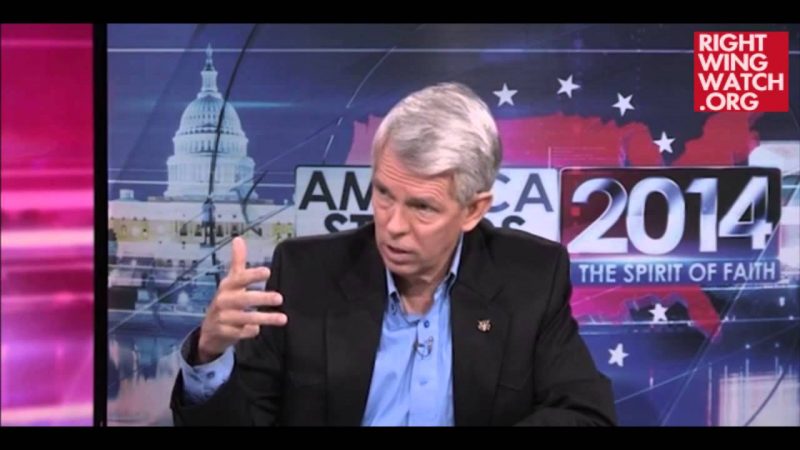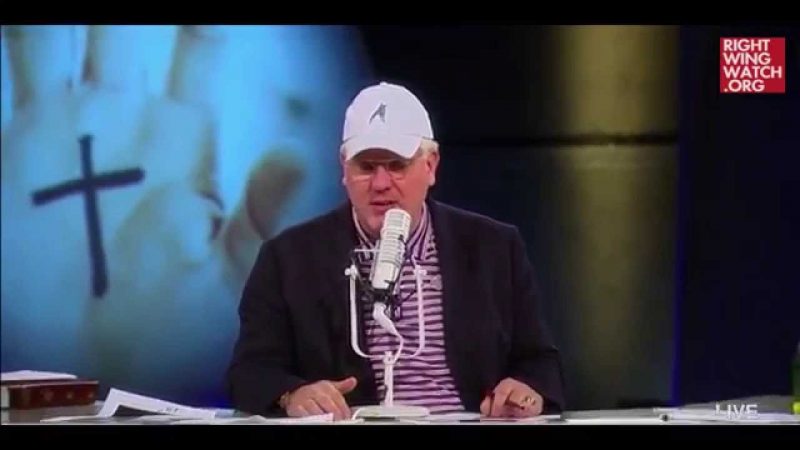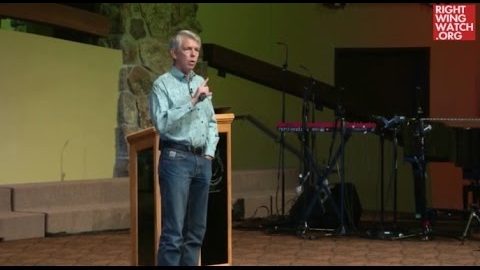David Barton, a Religious Right activist, Republican partisan, and self-declared historian, appeared on “The Daily Show” with John Stewart on May 4. (Video embedded at end of this memo.) A week before, People For the American Way had released an in-depth report, “Barton’s Bunk: Religious Right ‘Historian’ Hits the Big Time in Tea Party America.” Our report made clear that Barton’s distortions of history and the Constitution are especially troubling because he has been embraced by top GOP leaders, including actual and potential presidential candidates Newt Gingrich, Mike Huckabee, and Michele Bachmann. On “The Daily Show” and in an extended interview available online, Barton demonstrated a disturbing willingness to distort American history, misrepresent his own record, and promote a version of the U.S. Constitution that should be frightening to anyone who values religious liberty.
This memo summarizes some of Barton’s distortions, many of which were first reported on People For the American Way’s Right Wing Watch blog, and calls attention to the consequences of Barton’s belief that the First Amendment and Bill of Rights should not apply to the states.
Religious Freedom under Barton’s Christianist Constitution
In his conversation with Jon Stewart, Barton tried to evade many pointed questions about his distortions of history, but he eagerly explained his radically right-wing views of the Constitution and the First Amendment. The First Amendment and Bill of Rights were never meant to apply to the states, said Barton. He argued that the application of the Bill of Rights to the states in the wake of the post-civil war constitutional amendments, a core of modern American constitutional law, was a “strange twist of a court decision.”
Consider the consequences of Barton’s Christianist Constitution: states would be free to establish official religions and require people to swear oaths regarding their religious beliefs in order to take a state job, as a Maryland law required until an early 1960s Supreme Court decision. Barton shows little concern for the rights of religious minorities, saying that a majority in any community should be able to decide that its prayers will be said in public schools. Elsewhere he has admiringly quoted historical figures claiming that the First Amendment was not about protecting religious pluralism at all, but only designed to prevent the federal government from choosing one group of Christians over another.
Barton’s views betray basic American values of religious liberty and peaceful pluralism. It is appalling that any person who seeks to lead this country would embrace Barton’s vision of the Constitution.
Selected Distortions and Outright Lies
Deceptive efforts to undermine his critics
Barton told Stewart that his opponents take his comments out of context, asserted that he had never had to retract a single thing, and said his critics had never provided documentation of his manipulations. The first is a marvelous example of accusing your opponents of the very misbehavior you are engaging in; the second and third are demonstrably false. Serious historians, including some conservatives and evangelical Christians, are on the record dismissing Barton’s pattern of manipulating history to push his political agenda as “schlock history” and “pseudo-scholarship.” Detailed refutations of Barton’s claims, using the same historical documents he cites as authority, are readily available. And Barton’s own website includes an admission that a number of alleged quotations from the founders that he used to promote are inaccurate or non-confirmable from original documents.
Minimizing his interest in “Christian Nation” historical revisionism
Barton seemed eager to burnish his non-existent academic credentials as a historian by suggesting that promoting his ideas about the religious views and intentions of the founding fathers is a small part of his interest in, for example, the content of American textbooks. While it’s true that Barton’s efforts to infuse right-wing political ideology into Texas textbooks extended well beyond the founding era to include efforts to expunge civil rights icons like Cesar Chavez and Thurgood Marshall, Barton’s WallBuilders organization, his books, his “spiritual tours” of the U.S. Capitol, and his TV appearances with Glenn Beck demonstrate an overwhelming focus on ”proving” that the country’s founders were religious men who intended to build a Christian nation in which all laws would be in accord with biblical principles. That’s reflected in the views of the conservative state school board members who have brought Barton on for his “expertise.” Then-Texas School Board member Cynthia Dunbar admitted that it was the board’s goal to promote religion through the state’s textbooks to counteract “a Biblically illiterate society.” Former board chair Don McLeroy said that it was his job at the School Board to fight “secular humanists” because “we are a Christian nation founded on Christian principles” and “the way I evaluate history textbooks is first I see how they cover Christianity and Israel.”
Sticking to His False Story about Congress Printing Bibles
One of Barton’s favorite stories, because it seems to give his claims about church-state separation such a strong boost, is that Congress printed a Bible for use in America’s schools in 1782. In other settings, like Glenn Beck’s TV show, Barton says directly that the Bible was “printed by Congress” and “came out of the Continental Congress.” Barton said “congressional records” called the Bible is “a neat edition of the Holy Scriptures for the use of our schools.” Barton’s story is simply not accurate. Congress rejected both the publisher’s requests to have the Bible published under the authority of Congress, and his requests to have Congress make a large purchase of the Bibles. Congress did, at the publisher’s request, ask its chaplains to vouch for the Bible’s accuracy in translation and printing. The claim about the Bible being a “neat edition” for “use in the schools” was not made by Congress but by the publisher, who was losing money on the Bibles and was seeking a congressional bailout. When Jon Stewart called Barton on his false claims, Barton fell back on the congressional “endorsement” and his claim that the publisher needed congressional “permission” to produce the Bibles. He did not address his grossly misleading characterization of the publisher’s letter. See a more detailed refutation here.
Distorting John Adams’s Words and Denying It
Jon Stewart asked Barton about his characterization of an 1809 letter by John Adams, one of Barton’s most egregiously misleading uses of a historical document. Barton’s response was to say that he has posted the entire letter online so that it is impossible to say he was using it out of context. Researcher Chris Rodda shreds this claim with video of Barton speaking at a 2008 conference. Barton showed the audience an image of the difficult-to-read letter on an overhead projector, while superimposing and reading selected text. Barton quoted several pieces of a long passage making it seem as if Adams is endorsing the notion that “There is no authority, civil or religious — there can be no legitimate government – but what is administered by this Holy Ghost. There can be no salvation without it — all without it is rebellion and perdition, or, in more orthodox words, damnation.” But Barton does not include the sentence which immediately follows, which is “Although this is all Artifice and Cunning in the secret original in the heart, yet they all believe it so sincerely that they would lay down their Lives under the Ax or the fiery Fagot for it. Alas the poor weak ignorant Dupe human Nature.” In other words, Adams was mocking the very point that Barton claims he was making. Posting the entire letter online does nothing to negate the ways he has deliberately, clearly, and completely transformed Adams’ actual meaning in discussing the letter in front of activist audiences.
The Treaty of Tripoli
In discussing the 1797 Treaty of Tripoli and its clear declaration that “America is not, in any sense, founded on the Christian religion,” Barton told Stewart first that the language in the treaty’s Article 11 did not mean what it clearly states, and second that the U.S. State Department says there really is no Article 11 in the Treaty. Here is the full text of Article 11:
As the Government of the United States of America is not, in any sense, founded on the Christian religion,—as it has in itself no character of enmity against the laws, religion, or tranquility, of Mussulmen,—and as the said States never entered into any war or act of hostility against any Mahometan nation, it is declared by the parties that no pretext arising from religious opinions shall ever produce an interruption of the harmony existing between the two countries.
Barton argues unconvincingly that the Article was only meant to imply that American Christianity is different than European Christianity. His assertion that Article 11 is not in the treaty is simply wrong; it was unquestionably included in the treaty that was ratified unanimously by the Senate and approved by John Adams. Find more details here.
Barton’s Bizarre Claims About Article VII of the Constitution
Barton repeated a bizarre claim he makes about the Constitution: that Article VII contains religious references by “incorporating” the Declaration of Independence into the Constitution. In fact, the text of Article VII is: “The Ratification of the Conventions of nine States, shall be sufficient for the Establishment of this Constitution between the States so ratifying the Same.” Missing the religious references? Here’s Barton’s theory: the line that follows Article VI reads, “Done in Convention by the Unanimous Consent of the States present the Seventeenth Day of September in the Year of our Lord one thousand seven hundred and Eighty seven and of the Independence of the United States of America the Twelfth.” Barton says this vague passing reference to the Declaration of Independence incorporates that document and its reference to rights endowed by a Creator into the U.S. Constitution, making the Constitution a religious document that reflects and requires a national acknowledgment of God’s hand in our founding, history, and prosperity. But as Jon Stewart pointed out repeatedly, the writers of the Constitution had that debate, and those who argued for a more theocratic form of government lost. What the founders gave us was the First Amendment.
Barton’s Bogus Claims of Religious Persecution
Barton argues that his “Christian nation” advocacy is needed to ward off hostility toward religion in the U.S. Stewart was appropriately skeptical, if not incredulous, at the notion often promoted by Religious Right groups that Christians are persecuted in this country (as compared to China, for example). Indeed, the Religious Right’s claims about the impending “criminalization of Christianity” collapse under scrutiny. Barton, referring to a lawsuit by the Freedom from Religion Foundation against the federal law declaring a National Day of Prayer, dramatically distorted the goals of the legal challenge. Barton asked, “Why would people want to tell me I can’t pray if I want to?” The answer of course, is that nobody has tried to prevent Barton from praying or celebrating a National Prayer Day. The FFRF lawsuit was challenging the federal law, passed in 1952 and modified in 1988, which requires the president to declare a National Day of Prayer. Whether or not you agree with the FFRF’s arguments, a legal challenge to government endorsement of, and exhortation to, religious practice, is not remotely equivalent to an effort to silence any individual’s right to pray.
A Call for Accountability
David Barton misuses historical documents to promote a distorted view of American history, and he has a dangerously limited view of constitutionally protected religious liberty. Politicians who embrace David Barton in hopes of winning votes from his evangelical supporters should be held accountable for the vision of America they are endorsing








